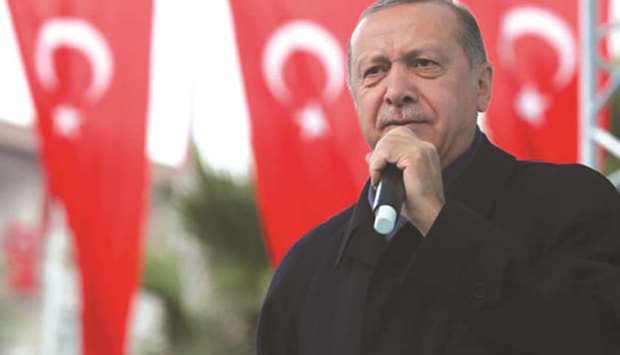In Riyadh, the de facto ruler of Saudi Arabia, Mohamed bin Salman (MbS), will open an investment showpiece declaring the kingdom open for business.
In Ankara, meanwhile, Recep Tayyip Erdogan is expected to make a speech that may well shut the beleaguered kingdom down.
Such are the stakes when Erdogan takes to a podium to discuss the death of Saudi dissident Jamal Khashoggi that the region may not be the same when he’s finished.
Erdoan has pledged to table the “naked truth” about what happened to the columnist and critic, whose fate continues to grip both countries and polarise the Middle East.
If he stays true to his pledge, much of the evidence that Turkey has gathered, incriminating Saudi Arabia in a premeditated plot to kill Khashoggi, will be revealed: in pictures, video and even bloodcurdling audio said to document his torture and death.
Setting the scene yesterday, a spokesman for the ruling party for the first time described Khashoggi’s death as a “complicated murder” that was “monstrously planned”. That Erdogan, not his bureaucrats, is now prepared to put his name to the material takes this extraordinary event to a new level.
The Turkish leader is expected to accuse the inner sanctum of power in Riyadh of organising a hit on Khashoggi, directly contradicting its claims that state officers had acted beyond their authority in a bid to please their masters.
Such an allegation carries with it a weight not yet seen in Riyadh, where blanket early denials had first given way to begrudging disclosures, then partial admissions, cover-ups and fall guys.
Dread is the order of the day, as the already-troubled investment conference looms.
And in some quarters of the royal court, a palpable sense of panic has taken hold.
Erdogan has the Saudis — in particular Prince Mohamed (AKA MbS) — right where he wants him.
Out of crisis has come opportunity for the veteran Turkish leader, who has never warmed to the brash 33-year-old, and thinks even less of his regional allies.
The two men have vastly different visions for the future of the region: Erdogan has been a champion of political Islam both at home and abroad, particularly since the rise and fall of Mohamed Mursi, the ill-fated former prime minister of Egypt who hailed from the Muslim Brotherhood.
The Turkish president has partnered with Qatar, given shelter to those exiled after Mursi fell, and remained a bulwark for a movement that both Riyadh and its ally, the United Arab Emirates, see as existential threats.
Prince Mohamed, meanwhile, has been attempting to remodel Saudi Arabia, turning it into an Arab nationalist police state.
Abu Dhabi and Cairo are models here.
And with Riyadh, the triumverate had been in the ascendant regionally, ever since Mursi fell.
For Erdogan, the gruesome killing marks a historic moment; a chance to turn the tables gifted to him by a cruel and reckless act that has sparked lasting revulsion even among the kingdom’s allies.
“This has become a strategic struggle between Erdogan and his vision for the Middle East and a vision shared by MbS and his allies, MbZ [Mohamed bin Zayed, the crown prince of Abu Dhabi] and [the Egyptian president Abdel Fatah] al-Sisi,” said Soner Cagaptay, director of the Turkish programme at the Washington Institute.
“Erdogan sees an opportunity in the Khashoggi murder — in that he realises MbS has become the weakest link in the anti-Erdogan, anti-Muslim Brotherhood corner of the region. This is really thin ice that MbS is dancing on and I think Erdoan is attempting to make it even thinner. “The roots really go back to 2013 [when Mursi was forced out of power]. He has refused to deal with the Sisi government, calling it illegitimate.
Senior Saudis who sought solace from Erdogan in Ankara in the past fortnight left town believing he had an even bigger prize in sight — relaunching Turkey as a regional Islamic power base, while diminishing Riyadh’s claim to be the pre-eminent voice for Islam.
Khaled al-Faisal, the governor of Makkah, returned after seeing Erdogan and was really worried, one senior member of the royal family has revealed. “He wasn’t budging, he didn’t want to listen to anything we said. Al-Faisal came back and told the King we have a crisis.”
Cagaptay believes Erdogan’s goals are more limited, for now. “He wants not to go after the Saudi royal family, to whom he’s deferential, including the King. What he’s trying to get out of this is to sideline, or maybe even neutralise MbS at least when it comes to Turkey. He wants to take one of his opponents out of that triple entente that opposes him.”



